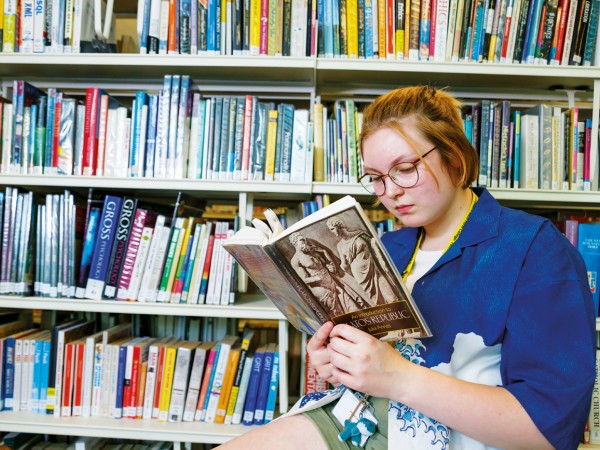Religious Studies A-level consists of 3 main areas of study.
Philosophy of Religion considers some big questions of human existence. Why are we here? What is a human? Is there a God? What might happen after we die? Can we resolve the problem of evil and suffering? We consider these questions alongside a study of how thinkers over time have responded to them, and consider what makes a sound argument.
Ethics greets us each morning in the newspapers and bids us good night on the evening news. Questions and dilemmas challenge us on a personal level all the time in our relationships at home, college or in society. You will study how people come to make decisions on a whole range of issues in medicine, business and sexuality.
In the third module, Developments in Religious Thought, you will study one particular religion and focus on its key beliefs and practices, as well as how these have developed over time. This will also provide an opportunity to reflect on and explore the place and role of religion in the modern world, considering how law and society impact on and are changed by religion.
Course Content
Awarding Body: OCR Religious Studies (H573)
Three papers: all examined at the end of Year Two
Unit 1
Philosophy of Religion – 2 hr written paper, 3 from 4 essay questions
Unit 2
Ethics – 2 hr written paper, 3 from 4 essay questions
Unit 3
Developments in religious thought – 2 hr written paper, 3 from 4 essay questions. The exact module number depends on the religion studied
Awarding Body: OCR Religious Studies (H573)
Three papers: all examined at the end of Year Two
|
Unit 1
|
Philosophy of Religion – 2 hr written paper, 3 from 4 essay questions |
|
Unit 2
|
Ethics – 2 hr written paper, 3 from 4 essay questions |
|
Unit 3
|
Developments in religious thought – 2 hr written paper, 3 from 4 essay questions. The exact module number depends on the religion studied |
Methods of Teaching and Learning
The course is designed to be taught with a close overlap between the three areas of study, so that you will find that you are developing your understanding in parallel across the units, with introductory topics followed by more advanced topics from Philosophy and Ethics, alongside connected themes in the religious thought in the religion studied. At the end of each topic you will be assessed by completing a written task, usually but not exclusively an essay, modelled on an examination question.
The course is tutored by well-qualified staff that use a range of teaching methods – incorporating both lecture style learning and group and individual tasks. Students will be asked to do presentations, to do research, to develop their skills in structured discussion and analysis of arguments. Guided reading of primary sources is essential for those aspiring to higher grades.
The course is designed to be taught with a close overlap between the three areas of study, so that you will find that you are developing your understanding in parallel across the units, with introductory topics followed by more advanced topics from Philosophy and Ethics, alongside connected themes in the religious thought in the religion studied. At the end of each topic you will be assessed by completing a written task, usually but not exclusively an essay, modelled on an examination question.
The course is tutored by well-qualified staff that use a range of teaching methods – incorporating both lecture style learning and group and individual tasks. Students will be asked to do presentations, to do research, to develop their skills in structured discussion and analysis of arguments. Guided reading of primary sources is essential for those aspiring to higher grades.
Resources
Resources for this subject include an excellent range of textbooks, theological literature and structured task booklets. Website and PowerPoint presentations as well as thorough teaching resources provide much support for students of this course.
Resources for this subject include an excellent range of textbooks, theological literature and structured task booklets. Website and PowerPoint presentations as well as thorough teaching resources provide much support for students of this course.
Progression
Religious Studies is valuable for students going on to any degree course, as well as good training for a career. It is often studied as a preparation for medicine, law or journalism, but is invaluable to anyone as a citizen of our increasingly globalised world. It develops the ability to analyse and evaluate arguments and other perspectives concerning religion and culture.
Religious Studies is valuable for students going on to any degree course, as well as good training for a career. It is often studied as a preparation for medicine, law or journalism, but is invaluable to anyone as a citizen of our increasingly globalised world. It develops the ability to analyse and evaluate arguments and other perspectives concerning religion and culture.
Enrichment
There is a busy Chaplaincy programme at St Brendan’s which offers students who are interested in religion to explore faith further and to engage in a variety of social justice issues through a certificated CAFOD Young Leaders programme. There might also be the opportunity to listen to a guest speaker or attend a conference.
There is a busy Chaplaincy programme at St Brendan’s which offers students who are interested in religion to explore faith further and to engage in a variety of social justice issues through a certificated CAFOD Young Leaders programme. There might also be the opportunity to listen to a guest speaker or attend a conference.
Additional Costs
There are opportunities to participate in student conferences locally and to undertake residential visits which do involve a cost – these are all optional.
There are opportunities to participate in student conferences locally and to undertake residential visits which do involve a cost – these are all optional.

